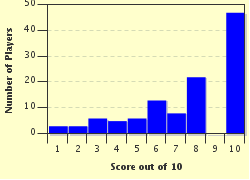Quiz Answer Key and Fun Facts
1. April 1775-First battles of the American Revolution.
2. June 1775-Loss for the colonists, however, they showed that unseasoned soldiers could hold their own before trained troops.
3. December 1775-Last attempt of colonists to recruit Canadian allies.
4. June 1776-British were repulsed from Charleston, a major patriot center of trade and shipping.
5. December 1776-Major victory for colonists in New Jersey - more enlistments and re-enlistments in the militia were forthcoming.
6. January 1777-British lost control of much of New Jersey, retreating to New York.
7. October 1777-After winning the second engagement, the colonists gained a new ally: France
8. October 1780-Patriots destroyed the Loyalist militia, British plans to invade North Carolina were cancelled.
9. January 1781-Patriots reconquered South Carolina - the battle was the beginning to the end of the war.
10. October 1781-Last major land battle of American Revolution - British surrendered.
Source: Author
ponycargirl
This quiz was reviewed by FunTrivia editor
bloomsby before going online.
Any errors found in FunTrivia content are routinely corrected through our feedback system.

